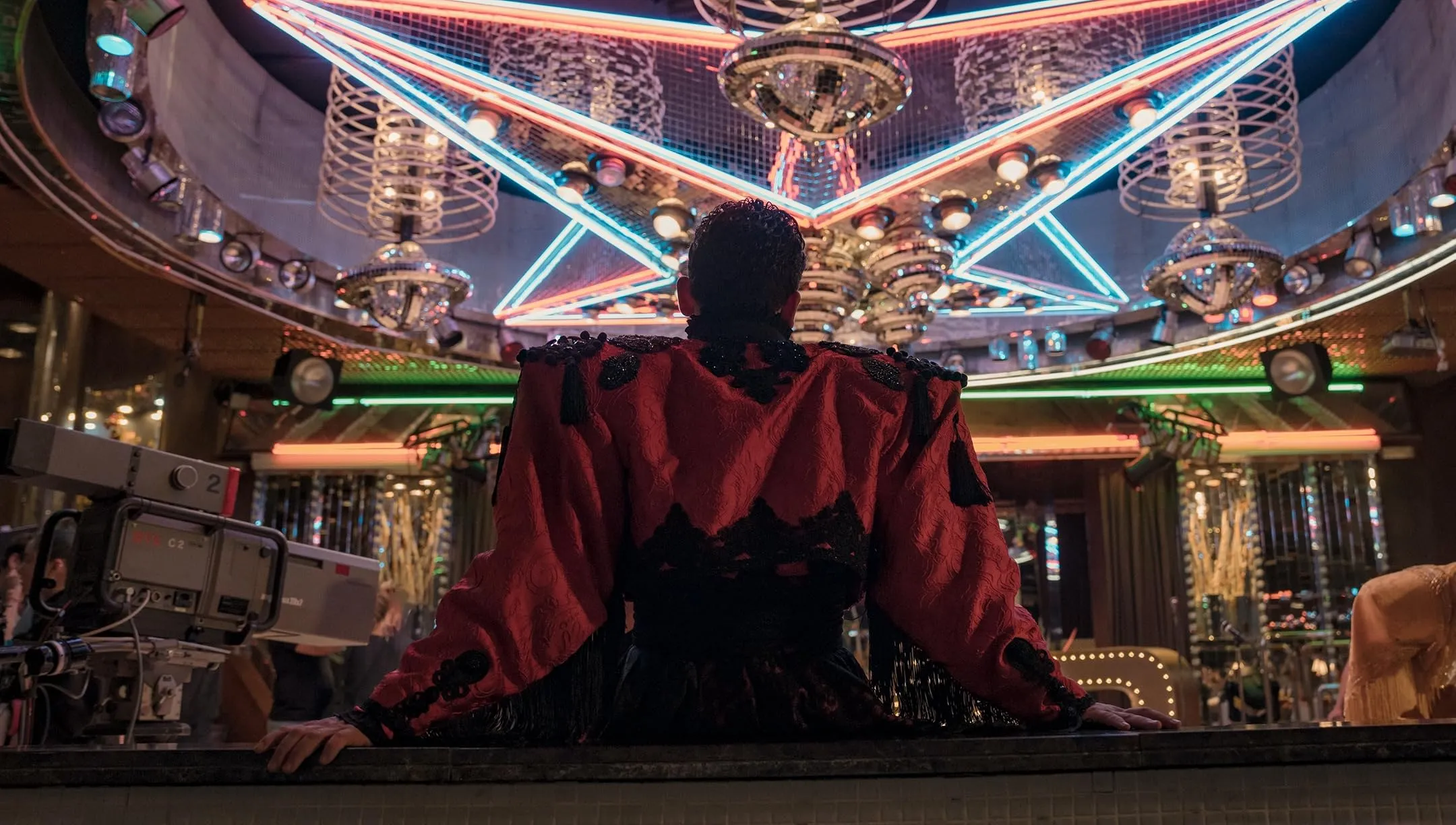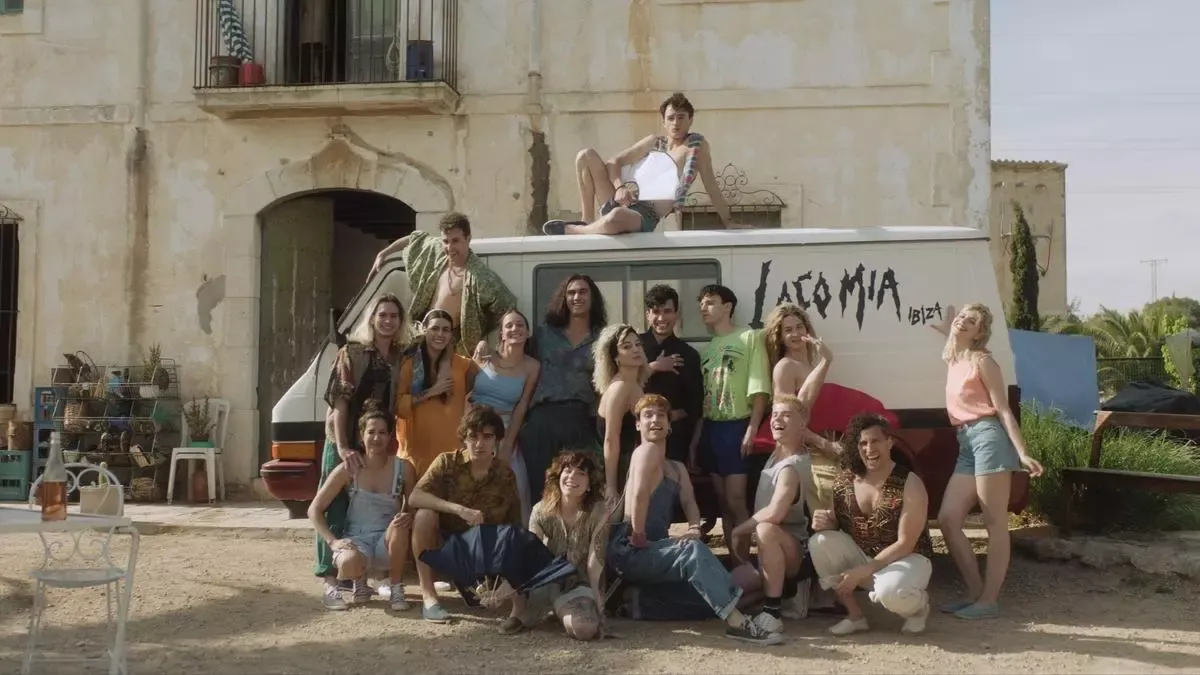In the lively 1980s of Spain, a band emerged that thrilled audiences with their vibrant dance performances and electrifying music. Locomía captivated clubgoers from Ibiza to Latin America with their fusion of colorful costumes and enthusiastic rhythms. Now, director Kike Maíllo invites viewers along on Locomía’s exciting journey from their beginnings in Ibiza’s nightlife scene to the heights of international stardom.
The new biographical film Disco, Ibiza, Locomía tells Locomía’s compelling story, exploring how the group came to be and what successes and struggles they encountered along the way. We learn about founder Xavi Font and his friends who arrived on the island seeking fame, developing a unique style that caught the attention of music producer Jose Luis Gil. Together they crafted Locomía into a sensation that dominated Europe’s dance floors and enchanted crowds across the Americas.
But Maíllo’s film does not simply recount Locomo’s rise to the top. It also provides glimpses into the personal challenges members faced underneath the spotlight’s glare. Tensions emerged that tested the band’s unity as popularity skyrocketed.
We witness their dynamic performances yet also catch a look behind-the-scenes at the realities rarely seen. Now on Netflix, Disco, Ibiza, Locomía invites viewers on an entertaining journey through Locomía’s past and Ibiza’s hedonistic 1980s world of music, dancing, and youthful self-expression.
Escaping to Ibiza’s Shores
Steep cliffs rise from sapphire waters, and quaint towns dot the island’s green hills. In the 1980s, Ibiza captivated a generation, drawing youth across Europe to experience its mystical allure. More than sandy beaches, what truly defined this Mediterranean paradise was music—pulsating rhythms pouring from every club, every plaza, and every cove under the stars.
During disco’s hedonistic reign, Ibiza offered liberated fun seekers a world apart from inhibitions. Swept up in the contagious currents of dance, visitors happily immersed in music’s ecstasy alongside drugs more liberal there than their homelands. Legendary venues like KU hosted performing troupes whose pulsing performances and colorful costumes, just like Locomía, electrified audiences night after night.
Spanish groups significantly shaped Ibiza’s cultural dominance. Pioneers including Locomía brought the island’s authentic vibrancy worldwide, popularizing electro genres through hits that still resonate decades later. “Locovox” turbocharged dancefloors continent-wide with its infectious synth-pop formula. “Fiesta Latina” sizzled even further abroad, the sun-drenched single an anthem across Latin America.
Through vision and verve, Locomía not only exploded onto hot European charts. They sparked a fashion trend: costumes of flamboyant fans emulated in clubs internationally.
Capturing the magic of the era, director Kike Maíllo insightfully transports viewers to Ibiza’s shores, the roots of Spain’s liveliest disco dynasty, and a cultural movement spanning Europe and beyond. In immersing us in this fascinating past, his film ensures the enduring legacy of those who partied without limits to electronic beats bouncing off the azure sea.
Profiles of Fire
At Locomía’s center stood Xavier Font, portrayed vibrantly by Jaime Lorente. While vocals fell beyond Xavi’s talents, his bold vision and charisma as leader sparked the group’s identity. Blanca Suárez breathes life into Lourdes Iribar, the sole member possessing real singing prowess yet replaced for political reasons.
Alejandro Speitzer shines as flamboyant frontman Carlos, radiating charm and confidence on stages worldwide. Other personalities left lasting impacts before departing, such as Manolo Arjona and Luis Font, replaced over time by talented successors like Juan Antonio Fuentes, who brought new dynamics steering Locomía’s direction.
Subtly driving their trajectory remained music mastermind José Luis Gil, brought to life vibrantly through Alberto Ammann’s nuanced performance. Beyond arrangement genius, Gil recognized in these disparate souls a fusion sparking magic through a united passion for performance. Each cast member embodied the complexity within seemingly glamorous professions, the inner conflicts simmering beneath colorful costumes and flashing lights.
Maíllo’s film taps into what fueled these figures’ fire—the diversity propelling Spanish music to global prominence. While non-conformity threatened stability and popularity, Locomía courageously stayed true to self-expression. Their defiance against restricting norms still resonates today; the characters reminding all outsiders possess invaluable gifts this world sorely needs would be diminished without. Locomía lives on as reminders that one’s worth stems not from any single metric but from the shared humanity connecting all dreamers who dance to their own rhythms.
Dancing in the Spotlight
The year was 1980 when a group of vibrant youths arrived in Ibiza chasing dreams of glory. Xavi Font led friends, including Blanca Suárez, hoping to make names in fashion amid the island’s hotspots. Yet serendipity worked its magic—their performances at Ku Club ignited a producer’s interest.
José Luis Gil perceived Locomía’s potential, offering mentorship that propelled their trajectory. Together they crafted a distinct image, fiery dance routines thrilling crowds with each appearance. Word spread quickly of the band’s fusing flair, beats, and vibrant energy, captivating listeners across the continent.
sold-out shows stretched from Madrid to Milan as 1980s Europe embraced Locomía’s fresh sound. But greater fortune still awaited—their magnetism also mesmerized Latin America. Audiences from Buenos Aires to Mexico City lined up in droves to experience the magic. At the height of success, the world seemed Locomía’s gilded stage.
Darkness loomed, however, behind the glory. As fame’s pressures mounted, cracks emerged—tensions rose as egos collided. Factors like addictions and clashing ambitions threatened to destroy what they’d built. Still, through all turbulence, one truth remained: Locomía had sparked a revolution in music, elevating Spanish pop to new global heights. Their bittersweet journey revealed that even the brightest stars contend with shadows.
Rhythms that Revolutionized
Locomía erupted onto stages with an unforgettable flair, captivating crowds through dance rooted in Spain’s rich traditions yet infused with pure innovation. Wafting fans and flamboyant ensembles unleashed members’ charisma, their moves leaving audiences mesmerized.
Songs like “Locovox” and “Fiesta Latina” injected clubs with euphoria, the anthems’ pulsing synthesizers and vocals in perfect sync with dancing feet. Their tunes breathed fresh life into the airwaves, radio finding homes for the band’s sun-drenched melodies that stretch from disco halls to sunny shores around the globe.
Within Disco, Ibiza, Locomía, musical master Camilla Uboldi seamlessly united these storied tracks with new compositions. Her score sweeps viewers straight onto the dancefloor alongside characters fully immersed in the 1980s spirit. Viewers practically feel the rhythm trembling through their souls beside stars like Jaime Lorente and Alejandro Speitzer, embodying performers’ raw magnetism and joy.
The film revives that unbridled energy flawlessly while expanding our understanding beyond surface level. It unveils moving human stories that inspired Locomía’s magic, reminders that creativity arises from complex individuals, not stereotypes, and sparks positive change by embracing diversity in all its forms. Through music, Locomía continues uplifting new generations just as they once electrified the world.
Immersive Voyage to the 1980s
Under Kike Maíllo’s deft direction, Disco, Ibiza, Locomía sweep viewers straight back to the luminous landscapes and pulsating nights of 1980s Spain. With Marc Miro’s cinematography, the screen dazzles with each sweeping vista of Ibiza’s blue waters and lush countryside.
Yet the true magic resides within close-ups where unspoken truths shine through gestures. Maíllo conducts each scene with a rhythmic finesse that engages without relying on biography clichés. Instead, he lays bare the heart and soul of Locomía’s origin, the desires and dreams manifesting their music.
Camilla Uboldi’s score works similar wonders, Locomía’s legendary tunes flowing beautifully alongside new melodies. Together, they transport the mind and body directly onto vibrant dancefloors. Through these artistic feats, Disco, Ibiza, Locomía succeed in bringing to life an bygone era that influenced history.
Most marvelously, Maíllo achieves paying tribute while revealing moving human stories beneath surface excitement. His insights remind us that creativity arises from diversity of experiences, not stereotypes. By honoring Locomía’s outsiders with empathy and warmth, the film spreads their timeless message: when we embrace our differences as splendid treasures rather than threats, new heights of progress shine within reach.
Dancing into the Future
Through Disco, Ibiza, Locomía viewers embark on a vibrant musical voyage back to 1980s Spain. We reconnect with the multidimensional characters who shaped that generation’s freestyling spirit. Their magnetic energy and the era’s boundary-pushing sounds are brought to shining life once more.
Maíllo’s film pays touching tribute to Locomía’s journey while expanding our understanding of creative souls frequently reduced to caricatures. As biopics go, it artfully veers from familiar narratives, prioritizing empathy over exploitation. Above all, Disco, Ibiza, Locomía transport us to a period that cultivated youthful rebellion through inclusion—a lesson eternal in meaning.
For those seeking a window into cuando éramos másLocomía, it transports us to a period that cultivated youthful rebellion through inclusion—a lesson eternal in meaning.
For those seeking a window into cuando éramos másLocomía, it transports us to a period that cultivated youthful rebellion through inclusion—a lesson eternal in meaning.
By reviving disco’s dawn on Ibiza’s shores, the film ensures appreciation of Locomía’s soundtrack and cultural edification endure. While 1980s decadence fades slowly into nostalgia, the film reminds us that progress stems from embracing each generation’s visionaries and not restricting their unique gifts. Disco, Ibiza, and Locomía invite all exploring Spanish music’s past to again lose themselves joyously in a dance without limits.
The Review
Disco, Ibiza, Locomía
Disco, Ibiza, Locomía tells the moving true story of the iconic band Locomía with great enthusiasm, empathy, and cultural insight. Director Kike Maíllo succeeds in transporting viewers back to 1980s Spain through lyrical visuals, an electrifying soundtrack, and nuanced character portrayals. Rather than relying on biopic tropes, the film values intimacy over exploitation to reveal the human hearts that elevated an entire era with their fiery passion for creativity and self-expression. Disco, Ibiza, Locomía pay heartfelt homage to Locomía while keeping their defiant spirit alive. It deserves a strong recommendation for anyone wishing to understand better the transformative history of Spanish nightlife and music through a lens of joyous appreciation.
PROS
- Vibrantly brings 1980s Ibiza and Locomía's origin story to life
- Features phenomenal soundtracks of period hits blended with new score
- Pays heartfelt homage to Locomía without relying on biopic clichés
- Prioritizes character depth over superficial dramatic tropes
- Transports viewers back in time through lyrical cinematography
CONS
- Could further develop the internal complexities of some characters
- Might not appeal as much to those without interest in Spanish culture.
- Relies on prior knowledge of Locomía, lacking context for newcomers





















































